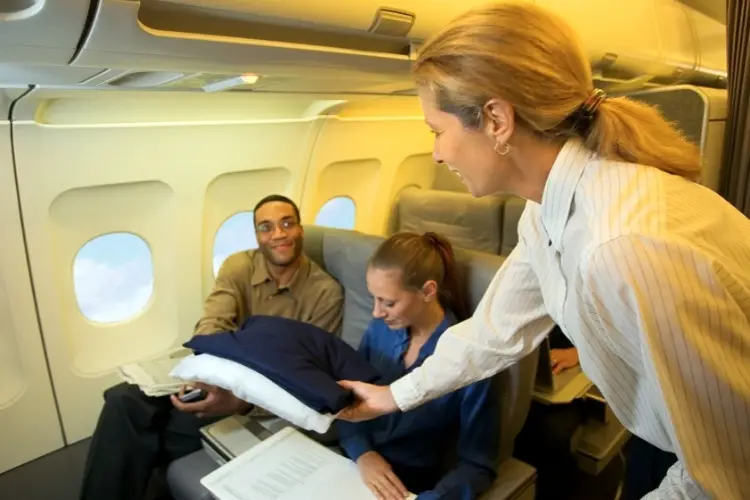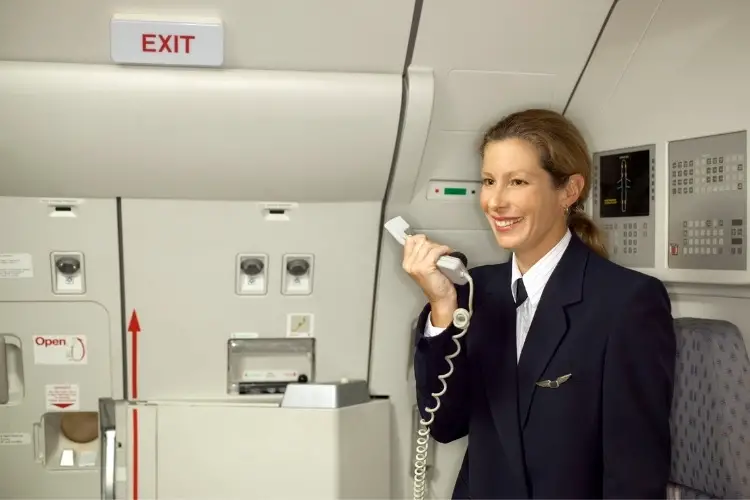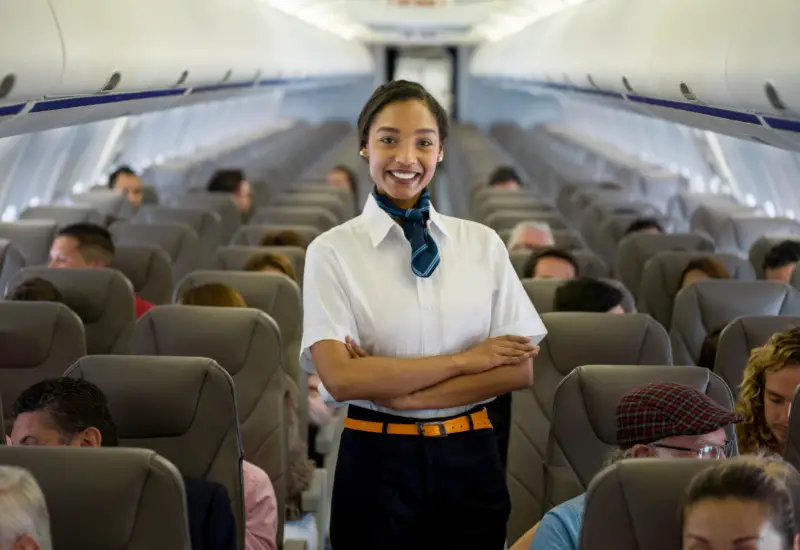What is it like to spend your life flying the friendly the skies? It’s more than serving diet coke and handing out pretzels, there are actually quite a few opportunities for flight attendants to advance their careers and take on new roles within the airline they work for.
All airlines are different, but one of the best things about working for an airline is its flexibility, and many of the “advancement” options described here allow you to switch things up over the course of your career, and do not necessarily follow the linear flow of career advancement that we think of.
1) Economy class – Business class – First Class

The class you work in on the airplane is one form of career advancement for flight attendants.
Depending on the airline, you may have to earn your right to work in business and first class by gaining experience and seniority, but not all airlines are like this, however.
At American Airlines I worked my first business class flight my third week out of training.
Generally speaking, however, the positions that serve the business and first-class cabins are coveted and will be given to more senior flight attendants based on seniority privileges, even if there is no formal requirement.
That means if you want to work, “Paris, First Class, International,” (yes that’s a View from the Top reference), you will need to put in a few years with the airline first.
2) Lead Flight Attendant/ Cabin Supervisor
Being a lead flight attendant, or Cabin Supervisor means you are “in charge” of the rest of the crew you are working with and are responsible for working directly with the gate agents, pilots, and passengers to ensure that everyone has a smooth and enjoyable flight.
Working as the lead flight attendant usually also comes with an increase in your responsibilities and a slight pay increase.
At some airlines you will have to obtain a certain about of seniority before you are allowed to work as the lead flight attendant, at others you just have to be senior enough to hold the position against other flight attendants.
If you would like to learn more about this position, I recommend checking out our article, What is a Cabin Manager? What Duties and Responsibilities Do They Have?
3) Flight Pursers

Flight pursers are the “lead flight attendants” on international flights.
Pursers have a wide range of responsibilities, and you typically need to have over ten years of experience and seniority before you can take the training to become a flight purser.
We discuss that process at length in our article, How to Become a Flight Purser: Everything You Need to Know.
Working as a purser does come with a significant pay increase.
4) Trainer/Instructor
As a flight attendant turned instructor (well for university), I can tell you that teaching is a very rewarding thing to do.
As a flight attendant instructor, you get the opportunity to teach other people how to do the job you love.
Most of the time instructors are hired though an internal process, and you can usually apply after 3-5 years of flying experience.
Although every airline is different, most of the time working as an instructor is considered a “special assignment” and is paid a bit differently than flying.
Instructors are usually responsible for teaching incoming classes of new hire flight attendants, as well as, conducting the regular continuing education and requalification programs that flight attendants have to complete from time-to-time to maintain their wings.
If you become an instructor and end up missing the excitement of flying, you can always return to regular flying too.
Hence the flexibility in career advancement I spoke about above.
5) Recruiter

Recruiters work with the talent acquisition department to help hire new flight attendants.
As with being an instructor, becoming a recruiter is usually a “special assignment” and since hiring is usually done in batches, you would typically spend a few months in this role, before returning to flying.
Recruiters review applications, conduct online, and in-person interviews, and ultimately get to decide who will be hired.
Every airline is different, but you can usually apply for a spot on the recruitment team after 2-5 years of flying.
6) Flight Service Administrator (FSA)
While I was working for American, I had a number of friends who decided to become a flight service administrator.
These folks work on the ground and have a more typical work schedule.
It’s a great role if you need a break from flying.
FSAs are staffed in crew rooms to help flight attendants with the administrative side of being a flight attendant, like answering questions, lending out back-up tablets, putting in orders for uniforms, etc.
The pay scale for FSAs is different from “on-the-line” flight attendants, and does not necessarily result in a pay increase, but it is a great option for people who want to learn more about how airlines work behind the scenes.
7) Flight Attendant Manager
Flight Attendant Managers are in charge of groups of flight attendants and are responsible for rewarding flight attendants for great work, as well as, holding flight attendants accountable when expectations are not met.
Flight Attendant Managers are also involved in daily operations at the airport and tend to help facilitate complicated boarding processes for international flights, along with the crew.
They are mostly on-hand to play a supporting role.
Some of the duties of Flight Attendant Managers include:
- Facilitating the probation period of new hires
- Conducting “check rides” to ensure flight attendants are adhering to company service standards and federal regulations
- Meeting flights that had an inflight event
- Debriefing flight attendants that were involved in emergency situations
- Reviewing reports submitted by flight attendants about passenger misconduct, catering mess-ups, etc.
Becoming a flight attendant manager is a true promotion and can become a stepping stone to leaving the flight-service world and entering the world of corporate airline management if you are interested in making that switch.
Flight attendant managers are always hired from within.
8) Flight Attendant Base Managers
Flight Attendant Base Managers work above the Flight Attendant Managers to ensure that the base’s flight service operations run smoothly.
There is usually one base manager per base that works closely with the head pilot.
This job also entails working directly with the corporate leaders.
FA Base Managers are responsible for things like:
- Route planning
- Staffing allocation
- Speaker requirements
- Continuing education/training
This role is the highest-level promotion a flight attendant can achieve while staying within the umbrella of flight-service.
All other promotions would take you directly to the corporate level.
It also comes with a significant pay increase.
Not all Base Managers are hired from within, however. Some are hired from other airlines, and even other industries. So, this “promotion” is more competitive to receive.
How do Flight Attendants Get Promoted?
With the exception of the base managers, all promotional processes are internal and usually begin with an application process of some kind. These searches are not always widely publicized, so you do sometimes have to go looking for information about when the selection processes will take place and how to apply.
Of course, flight attendants are also automatically “promoted” every year as they gain seniority, pay raises, and better access to the best routes.
Summary
In summary, flight attendants are promoted to new roles and positions from being a lead flight attendant, to becoming the base manager, through the accumulation of experience, and from internal selection processes.
The types of promotion vary, and there is plenty of flexibility to “regress” back to flying.




Thanks for such an informative website!! I just put in applications to American and Alaska Airlines for Flight Attendant positions. You are a wealth of information and I so appreciate it!! I come from a 30-year real estate career in San Diego, my sister has flown for Alaska for 32 years and I think since I too enjoy people, travel, and don’t mind working weird hours, holidays, etc it could be my next career.
Thanks Debi! Glad you like the website 😊
We really do our best to provide informative content to help readers like you.
Best of luck with your next career! It’s totally worth it!